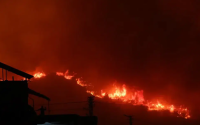Common Dreams / Published on Friday, December 1, 2006 by the New Zealand Herald
The Ross Ice Shelf, a massive piece of ice the size of France, could break off without warning causing a dramatic rise in sea levels, warn New Zealand scientists working in Antarctica.
A New Zealand-led ice drilling team has recovered three million years of climate history from samples which gives clues as to what may happen in the future.
 A New Zealand frigate sails past the Ross Ice Shelf in 1999. An iceberg warning has been issued for ships in the Southern Ocean after more than 100 were sighted just south of New Zealand.(AFP/File) A New Zealand frigate sails past the Ross Ice Shelf in 1999. An iceberg warning has been issued for ships in the Southern Ocean after more than 100 were sighted just south of New Zealand.(AFP/File) |
The team's co-chief scientist, Tim Naish, told The Press newspaper the sediment record was important because it provided crucial evidence about how the Ross Ice Shelf would react to climate change, with potential to dramatically increase sea levels.
"If the past is any indication of the future, then the ice shelf will collapse," he said.
"If the ice shelf goes, then what about the West Antarctic Ice Sheet? What we've learnt from the Antarctic Peninsula is when once buttressing ice sheets go, the glaciers feeding them move faster and that's the thing that isn't so cheery."
Antarctica stores 70 per cent of the world's fresh water, with the West Antarctic Ice Sheet holding an estimated 30 million cubic kilometres.
In January, British Antarctic Survey researchers predicted that its collapse would make sea levels rise by at least 5m, with other estimates predicting a rise of up to 17m.
Dr Naish, a sedimentologist with the Institute of Geological and Nuclear Sciences, said one day the drilling team retrieved a core of 83m, far greater than expected, which contained climate records spanning about 500,000 years.
"We're really getting everything we've dreamed of. What we're getting is a pretty detailed history of the ice shelf," he said.
"You go from full glacial conditions to open ocean conditions very abruptly. It doesn't surprise us that much that the transition was dramatic.
"Scientists knew from the collapse of the Larsen Ice Shelf in 2002 that expanses of ice could collapse "extremely quickly".
Once dating of the sample was completed, researchers would be able to look at what the ice shelf was doing during periods when scientists knew from other evidence that it was 2degC to 4degC warmer than today, Dr Naish said.






